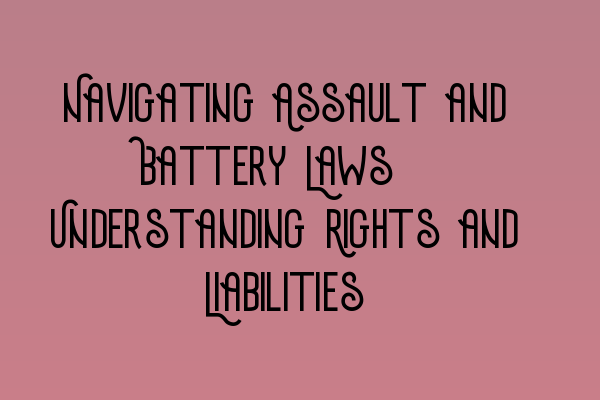Navigating Assault and Battery Laws: Understanding Rights and Liabilities
Assault and battery are serious offenses in criminal law that can have significant implications for all parties involved.
As a leading law firm specializing in criminal law in the UK, SQE Criminal Law & Practice Law UK understands the
complexities surrounding assault and battery laws. In this article, we will guide you through the essentials of
assault and battery, helping you understand your rights and liabilities in such cases.
What is Assault and Battery?
Assault and battery are often used interchangeably, but they are distinct legal concepts. Assault refers to the
intentional act of causing apprehension or fear of immediate harmful or offensive contact. While battery refers to
the actual physical contact that results in harmful or offensive bodily touching without consent. It’s important to
note that assault does not require physical contact, whereas battery does.
Understanding Your Rights
If you have been a victim of assault or battery, it is crucial to understand your rights and the legal remedies
available to you. Seeking legal assistance can provide you with the necessary guidance and support to navigate
through the legal process effectively.
One of the key rights you have as a victim is the right to press charges against the perpetrator. This allows you to
seek justice for the harm caused to you and hold the responsible party accountable for their actions.
Additionally, it is essential to familiarize yourself with the relevant laws and statutes in your jurisdiction that
govern assault and battery offenses. This knowledge will empower you to make informed decisions and take appropriate
legal action when necessary.
Liabilities and Defenses
Understanding your liabilities is equally important, especially if you have been accused of assault or battery. In
such cases, it is crucial to consult with a criminal defense solicitor who can guide you through the legal
proceedings and help build a strong defense strategy.
Some common defenses in assault and battery cases include self-defense, consent, and defense of others or property.
Your solicitor will analyze the specifics of your case to determine the most effective defense strategy to protect
your rights and interests.
Expert Legal Guidance
At SQE Criminal Law & Practice Law UK, our team of experienced solicitors is well-versed in assault and battery laws
and can provide expert legal guidance in navigating these complex cases.
Whether you are a victim seeking justice or an individual accused of assault or battery, our solicitors understand
the emotional and legal challenges you face. We are committed to providing compassionate support and effective legal
representation to ensure the best possible outcome for our clients.
For more information on related topics, please check out our related articles:
